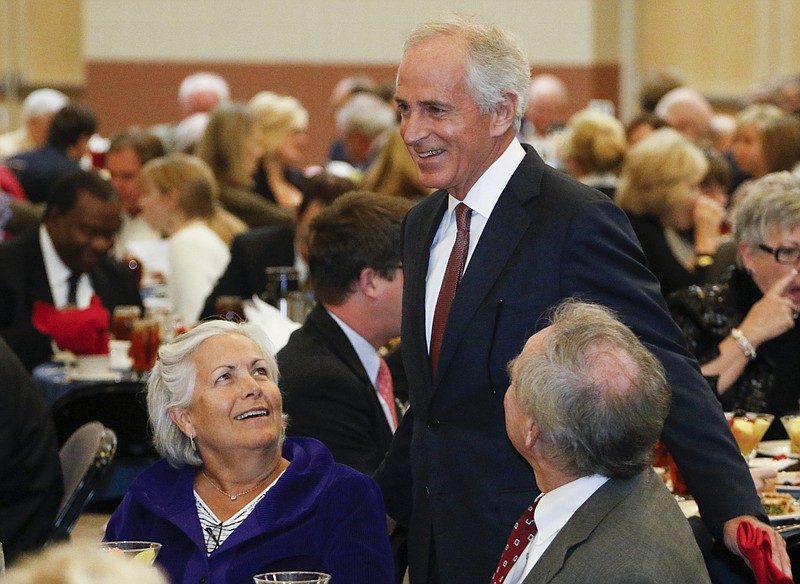One day before Tennessee's presidential primary in March, Sen. Bob Corker didn't take the opportunity to do what so many in his Republican Party had done and lambaste the presidential candidacy of businessman Donald Trump.
He didn't praise him, either, while speaking to a small gathering of reporters and editors in the University Center at the University of Tennessee at Chattanooga. But he seemed to acknowledge that the New York real estate magnate had just as much business in the race as anyone else.
"What people are looking for," said Corker, who did not endorse a candidate in the primary, "is a record of accomplishment and success, whether that's someone outstanding in classroom, whether that's a physician, whether that's a business person."
Trump certainly has that record.
Each candidate, Corker said, brings unique traits to the race. For him, he said, being a businessman had been a help in the public arena.
Just over two months after his appearance at UTC, Corker is being mentioned as a possibility to run as vice president on a ticket with Trump, the presumptive nominee. The chairman of the Senate Foreign Relations Committee also is being rumored as a potential secretary of state in a theoretical Trump cabinet.
We believe the Republican nominee, assuming it's the New York businessman, would signal his seriousness as a candidate if he were to tab the former Chattanooga mayor as his running mate or say he would be his pick as the nation's top diplomat.
Whether Corker would be willing to fill such a role may be known only by Corker.
For now, his staff is brushing off such talk.
"Sen. Corker has no reason to believe he is being considered for vice president," said spokeswoman Micah Johnson.
Yet, he has dared to go recently where few have tread - to praise Trump's first foreign policy speech and to offer him help in the area of foreign affairs, where Trump critics have rightly said he has no experience.
Indeed, before Texas Sen. Ted Cruz and Ohio Gov. John Kasich exited the presidential race, Corker said the Republican delegate leader's address was "a very good foreign policy speech." Then, a week later, Corker said Trump had called him and that he and the candidate's staff had talked since.
"I think he is well aware now that he has to move into a period of really laying out more substantial policies; and certainly, as he evolves, (and) to the extent we can be helpful and flesh those out, we are more than glad to do so," he said.
What Corker heard from Trump, he said, is a more realistic world view than perhaps had been taken by the last two presidents.
"Look," he said, "the foreign policy establishment in the last 15 or 16 years hasn't gotten things exactly right. What I hear in what he's saying is more of a George H.W. Bush view of the world. I hear him embracing more of a James Baker (secretary of state in President George H.W. Bush's administration) view of the world, and a larger degree of realism is making its way into his thinking, and I very much appreciate that."
At this point in his career, there is little downside to Corker being willing to serve in a potential Trump administration. Were the ticket to win, Corker - who has made little effort to hide his disappointment in the Senate's inability to act responsibly - would be able to put to even better use the knowledge he has gained as Foreign Relations Committee chairman. During his tenure as chairman and even before, he has made numerous trips abroad in order to steep himself in the inner-workings of foreign policy and has an encyclopedic knowledge of it.
And if the presumptive nominee is smart, he will line up other possible cabinet members, literally putting together a "dream team," in order to blunt his perceived lack of readiness for the office.
Were Corker, now 63, to be selected as vice president and the ticket to lose, he could continue to serve out his second term in the Senate. He next faces re-election in 2018. If he desires to run again in 2018, he would only be 74 at the end of that subsequent term, younger than Tennessee's senior senator, Lamar Alexander, is now.
But the former savvy Chattanooga businessman is notoriously independent and could also walk away from the Senate in 2019 and create a new career for himself.
In the meantime, we hope if Trump calls with a substantive offer - and Corker reads the offer as the Republican front-runner's wholehearted commitment to the office - that he'll answer in the affirmative.
